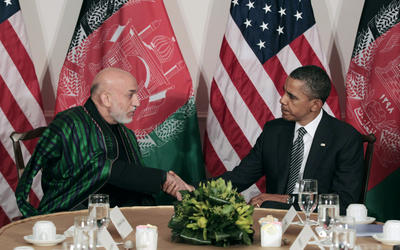This remains true in respect to constitutional amendment mechanisms. In order to legally enable himself to stand for office again, President Karzai would have to call a loya jirga — an assembly which is predominantly composed of the members of both houses of parliament and the less numerically-significant Chairs of Afghanistan’s District Councils and the bench of the Afghan Supreme Court. The jirga would then have to ratify the amendment by a majority.
One would expect such an amendment to be resoundingly defeated by the peoples’ representatives, given that Karzai’s predatory government is deeply unpopular with the overwhelming majority of the Afghan people. Unfortunately, this would be inconsistent with the interaction evidenced between Afghanistan’s first two democratic parliaments and the Karzai executive.
Constitutionally, the Afghan executive also has the power to determine the country’s electoral system, so long as it is ‘direct, free and fair’. The Karzai cabinet selected a system of single non-transferable voting for multi-member electorates, with candidates designated individually rather than by party, for election to parliament. But in a country beset by division along ethnic and political lines, this electoral formula notoriously discourages the development of cohesive political blocs with national-level agendas. It instead favours independent candidates, guaranteeing a parliament that closely reflects the country’s fragmentation.
The result is that parliamentary majorities do not form along ideological party lines, but have to be cobbled together from among individual parliamentarians for each vote. Afghanistan’s parliament endured a similar situation under its first democratic constitution of 1964, which was mired in shifting alliances founded upon bribery and nepotistic networks. This experience remains true of the new parliament, as the individual significance of each vote gives Afghanistan’s parliamentarians serious leverage in securing voting outcomes.
This has inevitably led to a susceptibility among those less-scrupulous members to engage in vote trading with the executive for legislative results when offered sufficient rents. From anecdotal accounts, the returns for some (but certainly not all) parliamentarians in their early terms range from money, induction into the lucrative patronage networks emanating from the central government, and executive support in gaining re-election. This latter could involve the provision of security services while campaigning or even pork-barrelling in local constituencies.
These patterns result in uncertain parliamentary alliances and a generally incoherent body, not to mention an uncertain partner which the wider region must work with. They also engender a parliament that acts as an ineffective check upon the Karzai government’s power, which is reflected in the parliament’s inability to hold several of Karzai’s ministers accountable for misuse of office, even for gross abuses of power. All this suggests that if President Karzai were to put such an amendment to a constitutional loya jirga, made up by a majority of parliamentarians, it could pass successfully even despite popular discontent. The President’s powerful domestic supporters have already demonstrated the propensity and ability to secure favourable election results through nefarious avenues in Afghanistan’s 2009 presidential elections. Given this history, it seems quite likely Karzai will win a third term if he chooses to stand.
This outcome could potentially be averted through the exertion of significant international pressure and must therefore remain a focus of regional efforts. If not, Karzai’s election for a third term would bode further ill for this much-suffering country after the eventual US withdrawal, with his government proving careless and abusive in the face of its population’s needs. It would also represent a failure of the invading Coalition’s initial stated mission of securing a substantive and effectual democracy in Afghanistan and of bringing stability to a country that affects the interests of so many regional players.
Anna Verney is an ANU graduate in Bachelor of Arts (Honours)/Bachelor of Laws (Honours) and works as a Student Assistant Editor at Anton’s Weekly Digest of Law.

